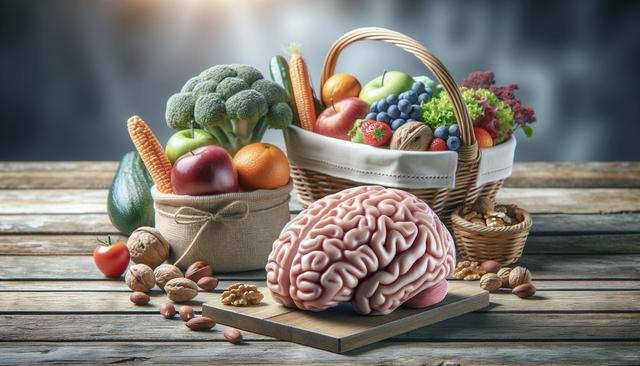Why Brain Health Should Be a Priority
The brain, like any other organ, needs proper nourishment to function at its best. From memory retention to emotional stability and cognitive performance, the quality of your diet directly influences your mental sharpness and well-being. While genetics and lifestyle habits also play important roles, the foods you consume every day can significantly support or hinder your brain’s performance. In fact, research continues to highlight the connection between certain nutrients and improved neurological health. Whether you’re a student, a busy professional, or simply looking to age gracefully, understanding which foods enhance brain health is a valuable tool for sustaining mental vitality.
Brain-friendly nutrients include omega-3 fatty acids, antioxidants, vitamins like B-complex and E, and minerals such as magnesium and zinc. These compounds work in harmony to reduce inflammation, support neurotransmitter function, and protect your brain from oxidative stress. When incorporated consistently into your meals, nutrient-dense foods can boost your focus, improve your mood, and help defend against age-related cognitive decline.
Leafy Greens: Nutrient-Rich Powerhouses
Leafy greens such as spinach, kale, and Swiss chard are packed with essential nutrients that contribute to optimal brain health. These vegetables are rich in vitamin K, lutein, folate, and beta carotene—nutrients that are known to slow cognitive decline and support memory function. The high antioxidant content in leafy greens also helps protect brain cells from damage caused by free radicals.
Incorporating leafy greens into your diet can be simple and versatile. Consider the following ideas:
- Add spinach to smoothies for a nutrient boost without altering the flavor.
- Use kale as a base for salads, topped with lean protein and nuts.
- Include sautéed Swiss chard as a side dish with your main meals.
Making leafy greens a regular part of your diet is a practical and effective step toward maintaining long-term brain health. Their high fiber content also supports gut health, which recent studies suggest may be linked to cognitive performance through the gut-brain axis.
Fatty Fish and Brain-Boosting Fats
Fatty fish like salmon, trout, and sardines are among the richest sources of omega-3 fatty acids—particularly EPA and DHA—that play a crucial role in brain structure and function. These healthy fats are essential for building brain cell membranes and improving communication between brain cells. A deficiency in omega-3s has been linked to learning impairments and mood disorders.
Consuming fatty fish a few times a week can provide the following benefits:
- Enhance cognitive function and memory retention.
- Reduce the risk of depression and anxiety.
- Lower the risk of age-related cognitive decline.
For those who prefer plant-based options, flaxseeds, chia seeds, and walnuts offer alpha-linolenic acid (ALA), a type of omega-3 that also supports brain health, though in a slightly less potent form. Including a variety of healthy fats in your meals helps maintain brain elasticity and supports neurotransmitter function, which is essential for learning and concentration.
Berries: Small Fruits with Big Benefits
Berries such as blueberries, strawberries, and blackberries are more than just sweet treats—they are rich in antioxidants, particularly flavonoids, which have been linked to improved memory and delayed brain aging. These compounds help reduce inflammation and oxidative stress, both of which can negatively affect brain function over time.
Regular consumption of berries can contribute to:
- Enhanced communication between brain cells.
- Improved motor coordination and balance.
- Reduced risk of neurodegenerative diseases.
Incorporating berries into your daily routine is easy. Add them to oatmeal, yogurt, or salads, or enjoy them as a snack on their own. Frozen varieties retain most of their nutrients, making them a convenient choice year-round. Their natural sweetness also makes them a healthier alternative to processed desserts and snacks, supporting overall health as well as cognitive well-being.
Nuts, Seeds, and Whole Grains for Sustained Energy
Nuts and seeds are excellent sources of brain-boosting nutrients, including vitamin E, magnesium, and healthy fats. Vitamin E, in particular, is known to protect cells from oxidative stress, which is especially important for preventing cognitive decline. Almonds, sunflower seeds, and hazelnuts are among the most nutrient-dense options. Meanwhile, whole grains like oats, quinoa, and brown rice offer sustained energy through slow-releasing carbohydrates that help maintain consistent blood sugar levels—essential for concentration and mental clarity.
Some easy ways to include these foods in your diet:
- Sprinkle flaxseeds or chia seeds over smoothies or yogurt.
- Snack on a handful of mixed nuts between meals.
- Use whole grain bread or pasta instead of refined versions.
These foods also support cardiovascular health, which is directly tied to brain performance. A healthy heart ensures efficient blood flow to the brain, delivering the oxygen and nutrients required for optimal function. Together, nuts, seeds, and whole grains form a solid foundation for a brain-supportive diet.
Conclusion: Elevate Your Mental Wellness Through Nutrition
Maintaining brain health doesn’t require radical changes—just thoughtful, consistent choices in your daily meals. By incorporating foods like leafy greens, fatty fish, berries, nuts, seeds, and whole grains, you provide your brain with the vital nutrients it needs to thrive. These foods work together to reduce inflammation, protect against cellular damage, and support mental clarity and emotional balance.
Whether you’re looking to enhance focus at work, support your memory, or simply take proactive steps toward long-term cognitive wellness, nutrition offers a practical and sustainable path. Start small, stay consistent, and let food be a key ally in unlocking your brain’s full potential.


